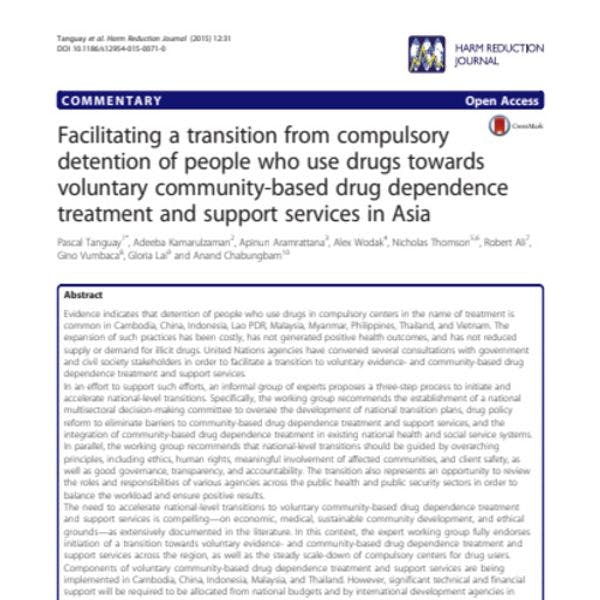Facilitating a transition from compulsory detention of people who use drugs towards voluntary community-based drug dependence treatment and support services in Asia
By Pascal Tanguay, Adeeba Kamarulzaman, Apinun Aramrattana, Alex Wodak, Nicholas Thomson, Robert Ali, Gino Vumbaca, Gloria Lai and Anand Chabungbam
Evidence indicates that detention of people who use drugs in compulsory centers in the name of treatment is common in Cambodia, China, Indonesia, Lao PDR, Malaysia, Myanmar, Philippines, Thailand, and Vietnam. The expansion of such practices has been costly, has not generated positive health outcomes, and has not reduced supply or demand for illicit drugs. United Nations agencies have convened several consultations with government and civil society stakeholders in order to facilitate a transition to voluntary evidence- and community-based drug dependence treatment and support services.
In an effort to support such efforts, an informal group of experts proposes a three-step process to initiate and accelerate national-level transitions. Specifically, the working group recommends the establishment of a national multisectoral decision-making committee to oversee the development of national transition plans, drug policy reform to eliminate barriers to community-based drug dependence treatment and support services, and the integration of community-based drug dependence treatment in existing national health and social service systems.
In parallel, the working group recommends that national-level transitions should be guided by overarching principles, including ethics, human rights, meaningful involvement of affected communities, and client safety, as well as good governance, transparency, and accountability. The transition also represents an opportunity to review the roles and responsibilities of various agencies across the public health and public security sectors in order to balance the workload and ensure positive results.
Keep up-to-date with drug policy developments by subscribing to the IDPC Monthly Alert.
Downloads
Topics
Related Profiles
- Pascal Tanguay
- Nicholas Thomson
- International Drug Policy Consortium (IDPC)
- Gloria Lai
- Alex Wodak
- Adeeba Kamarulzaman
